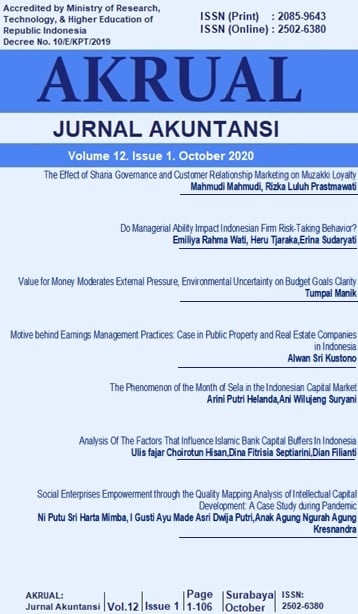Do Managerial Ability Impact Indonesian Firm Risk-Taking Behavior?
DOI:
https://doi.org/10.26740/jaj.v12n1.p18-33Keywords:
Firm Risk, Managerial Ability, Risk-takingAbstract
This study aims to examine the role of managerial in firm decisions. This study recognizes that managerial plays an important role in corporate decision making. Decisions carried out by the company are not only influenced by the manager's explicit mandate to maximize firm value, but also by the manager's ability to manage the company. In previous research it was found that high-ability and low-ability managers have opposite effects on firm behavior and firm value. High-ability managers accept risk-taking whereas low-ability managers refrain from taking risks. Managerial Ability in this study was measured using DEA (Data Envelopment Analysis) while for firm risk-taking behavior using the return on assets (ROA), return on equity (ROE), and research and development costs to total assets (R&D). The model used in this study is a causality model or the relationship of influence between research variables. The proposed model is analyzed using the Structural Equation Model (SEM) causality technique. This research was conducted on manufacturing companies listed on IDX (Indonesian Stock Exchange) in 2013-2017. However, unlike previous studies, the results of this study indicate that highly capable managers play a role in minimizing corporate risk taking. This research contributes as a reference for Indonesian corporate investors and also regulators as a reflection of the effectiveness of regulations made in Indonesia.
References
Andreou, P. C., Philip, D., & Robejsek, P. (2016). Bank Liquidity Creation and Risk-Taking: Does Managerial Ability Matter? Journal of Business Finance & Accounting, 43(1-2), 226259. doi:10.1111/jbfa.12169
Anthony, R. N., & Govindarajan, V. (1995). Management Control Systems. Eight Edition International Student Edition. Richard D. Irwin Inc. U.S.A.
Berk, J. B., & Stanton, R. (2007). Managerial Ability, Compensation, and the Closed-End Fund Discount. The Journal of Finance, 62(2), 529556. doi:10.1111/j.1540-6261.2007.01216.x
Bertrand, M., & Schoar, A. (2003). Managing with style: The effect of managers on firm policies. The Quarterly journal of economics, 118(4), 1169-1208. doi:10.1162/003355303322552775
Bloom, M., & Milkovich, G. T. (1998). Relationships Among Risk, Incentive Pay, and Organizational Performance. Academy of Management Journal, 41(3), 283297. doi:10.5465/256908
Bromiley, P. (1991). Testing a Causal Model of Corporate Risk Taking and Performance. Academy of Management Journal, 34(1), 3759. doi:10.5465/256301
Chemmanur, T. J., Paeglis, I., & Simonyan, K. (2009). Management quality, financial and investment policies, and asymmetric information. Journal of Financial and Quantitative Analysis, 1045-1079. doi:10.1017/s0022109009990299
Chen, Y., Podolski, E. J., & Veeraraghavan, M. (2015). Does managerial ability facilitate corporate innovative success? Journal of empirical finance, 34, 313-326. doi:10.1016/j.jempfin.2015.08.002
Cremers, K. M., & Petajisto, A. (2009). How active is your fund manager? A new measure that predicts performance. The review of financial studies, 22(9), 3329-3365. doi:10.2139/ssrn.891719
Demerjian, P., Lev, B., & McVay, S. (2012). Quantifying managerial ability: A new measure and validity tests. Management science, 58(7), 1229-1248. doi:10.2139/ssrn.1266974
Demerjian, P. R., Lev, B., Lewis, M. F., & McVay, S. E. (2013). Managerial ability and earnings quality. The accounting review, 88(2), 463-498. doi:10.2139/ssrn.1650309
Finkelstein, S., Hambrick, D., & Cannella, A. A. (1996). Strategic leadership. St. Paul: West Educational Publishing.
Francis, B., Sun, X., & Wu, Q. (2013). Managerial Ability and Tax Aggressiveness. Available at SSRN 2348695.
Hambrick, D. C., & Mason, P. A. (1984). Upper echelons: The organization as a reflection of its top managers. Academy of management review, 9(2), 193-206. doi:10.5465/amr.1984.4277628
Holcomb, T. R., Holmes Jr, R. M., & Connelly, B. L. (2009). Making the most of what you have: Managerial ability as a source of resource value creation. Strategic management journal, 30(5), 457-485. doi:10.1002/smj.747
Isnugrahadi, I., & Kusuma, I. W. (2009). Pengaruh Kecakapan Manajerial terhadap Manajemen Laba dengan Kualitas Auditor sebagai Variabel Pemoderasi. Universitas Gadjah Mada.
Jensen, M. C., & Meckling, W. H. (1976a). Agency Costs and the Theory of the Firm. Journal of Financial Economics, 3(4), 305-360.
Jensen, M. C., & Meckling, W. H. (1976b). Theory of the firm: Managerial behavior, agency costs and ownership structure. Journal of Financial Economics, 3(4), 305-360.
Jogiyanto, H. (2010). Teori portofolio dan analisis investasi (edisi ketujuh). Yogyakarta: BPFE.
March, J. G., & Shapira, Z. (1987). Managerial perspectives on risk and risk taking. Management science, 33(11), 1404-1418. doi:10.1287/mnsc.33.11.1404
Padovani, R. (2004). Lenterprise risk management nelle imprese non finanziarie: aspetti teorici e studi di caso nel mercato italiano.
Park, J., Ko, C. Y., Jung, H., & Lee, Y.-S. (2016). Managerial ability and tax avoidance: evidence from Korea. Asia-Pacific Journal of Accounting & Economics, 23(4), 449-477. doi:10.1080/16081625.2015.1017590
Wei, D. J. W. F. F. (2007). A Study on the Relationship between College Students' Emotion Management Ability and Their Mental Health [J]. Chinese Journal of Special Education, 9.
Yung, K., & Chen, C. (2018). Managerial ability and firm risk-taking behavior. Review of Quantitative Finance and Accounting, 51(4), 1005-1032. doi:10.1007/s11156-017-0695-0
Downloads
Published
How to Cite
Issue
Section
License
Copyright (c) 2020 AKRUAL: Jurnal Akuntansi

This work is licensed under a Creative Commons Attribution-NonCommercial 4.0 International License.
 Abstract views: 1156
,
Abstract views: 1156
, PDF Downloads: 820
PDF Downloads: 820


















